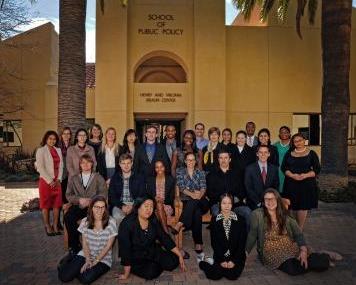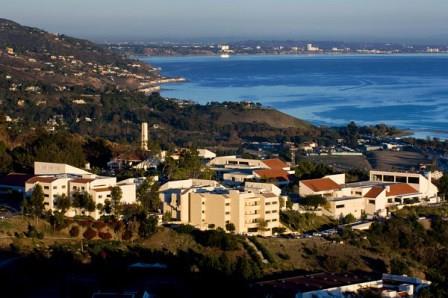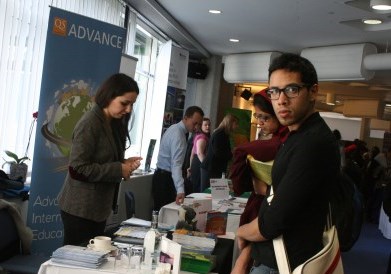QS is excited to announce two new public policy scholarships from Pepperdine University’s School of Public Policy, available exclusively to attendees of the QS World Grad School Tour. The scholarships are offered to students who have successfully been admitted to the school’s two-year Master of Public Policy program, and are worth at least US$20,000 per year.
Melinda van Hemert, Assistant Dean for Student Services, says these scholarships are open to students from anywhere in the world, adding that the school is keen to maintain the international diversity of its student community. “About 30% of our public policy students are from overseas, and we believe that the international aspect is important. It helps the US students as well as those from overseas, providing a good snapshot of the global network they’ll be joining within their careers.”
Van Hemert also points out that those applying to study public policy are typically motivated by altruistic goals, and by offering these public policy scholarships the school aims to help them achieve this. “Public policy by nature is a public service-type field. Students typically want to give back to their community, whether through nonprofit work, government agencies, NGOs or even in the private sector– and we want to support them in being able to do that.”
 A diverse Master of Public Policy class
A diverse Master of Public Policy class
As well as being internationally diverse, the course enrolment for Pepperdine’s Master of Public Policy is also diverse in terms of students’ academic background, professional experience, and future career aims. Some enroll immediately after completing an undergraduate degree, coming from a broad range of specializations. “They can be dance majors to engineers,” van Hemert says. Others have been working for five years, ten years or even longer, and enroll in the program as part of a change in career direction, perhaps moving into advocacy or activism, for example.
The diversity of the student body is reflected in the course content, which van Hemert says is based on a belief that a Master of Public Policy is not simply preparation for a career in government. The school takes a much broader definition of the field, encompassing both public- and private-sector organizations. “Public policy connotes government – but it is so much broader than that.”
She adds, “We want our graduates to be the next generation of leaders, whether they choose to work in the public sector, private, nonprofit, or NGOs. We want them to be able to think about all possible solutions when attacking a problem, and be open to the idea that government may not be the solution and that they should think of alternative solutions.”
 Multiple approaches to international relations
Multiple approaches to international relations
One of the areas of specializations that the school focuses on is teaching public policy in the context of international relations, and this is approached from several angles, van Hemert explains. “For those interested in economic development, we have courses in international aid, global economics, international conflict management, and region-specific classes on Asia, Africa, Latin America, Eastern Europe, and the Middle East. The other main focus is the US role in the United Nations, including issues of national security and freedom.”
The program starts with several key foundational courses, including the “Great Books and Great Ideas” module, which approaches public policy through historic and classical literature such as Aristotle, Plato and Machiavelli; and “The Roots of American Order: What is Public Policy?”, which provides students with a strong understanding of how public policy is formulated and the various bureaucratic processes involved.
Students are able to select whichever electives best match their own interests under the specialization they choose, and under the cross-registration policy, they’re able with approval to take some courses taught by other faculty of Pepperdine University, such as the business or law schools. Another option would be to pursue a joint degree with either of those schools. Overall, van Hemert says, the course is designed to be very practical, providing students with economic knowledge and research skills that have wide-ranging professional applications.
This practical focus is also reflected in the compulsory internship which all students are required to complete at the end of the first year, during the summer break from mid-April to the end of August. The minimum requirement is 240 hours, but this is typically longer, giving students essential first-hand experience of work in a public policy role.
 Are these public policy scholarships for you?
Are these public policy scholarships for you?
To apply for one of these public policy scholarships, you first need to be accepted into the Master of Public Policy program at Pepperdine University, as well as have attended a QS World Grad School Tour event. When assessing applicants, the school considers a broad range of factors, including standardized test scores, grade point averages (GPAs), essays, references, professional experience and extracurricular activities.
The single most important quality to display, van Hemert says, is evidence of leadership skills. “We will be looking for examples of how students have shown leadership, whether they were active in a student organization or local community, through volunteer work or if they took over a project – and we will help them develop those leadership skills throughout the program.”
Find out more about the Pepperdine University Public Policy Scholarships >
